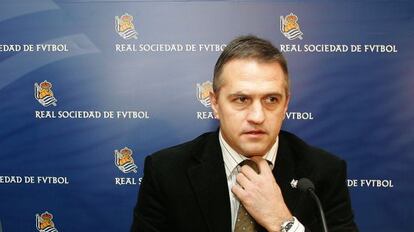Did Puerto medic supply La Liga?
Notes imply main doping case suspect sold banned substances to Real Sociedad

A note in handwriting very similar to that of Eufemiano Fuentes could be the key to solving one of the puzzles in the unfolding Operation Puerto doping trial: what does the inscription “RSOC” in the sports medic’s documents mean? The declarations of former Real Sociedad president Iñaki Badiola on Monday, reiterating what he said at a shareholders’ meeting in 2008, have placed Professional Football League president José Luis Astiazarán in the eye of the storm.
Badiola, who headed Real in 2008, said that for several years before his appointment the club “paid thousands of euros in black money to buy medicines and to pay Fuentes.” Astiazarán, who on Monday denied any knowledge of such practices, was at the helm of the club between 2001 and 2004, when it finished 13th, 2nd, 15th and 14th in La Liga.
One of the documents to which EL PAÍS has had access, titled “Accounts Asti,” details payments of tens of thousands of euros in January, February and April 2002 for medicines and of 12,000 euros to Fuentes himself. The sum of 5,382 euros for “German medicines” is noted down in February.
The figures on the document given to EL PAÍS by Badiola are similar to those in a due diligence report carried out by Ernst & Young at his behest in 2008. The numbers appear to shed light on the parallel accounting system in operation at Real between 2000 and 2005. The total amount recorded in the concealed books is 327,443 euros, which are attributed to the items “medicines” and “Gorrotxategi.”
It looks like it, but it should be Eufemiano who confirms it in court"
When he arrived at the club in 2008, Badiola removed the doctors Antxon Gorrotxategi and Eduardo Escobar from their posts.
Puerto investigators have linked German sports medic Markus Choina, whose wife is a pharmacist according to the Civil Guard, to Fuentes. A document dated 2003 and bearing the inscription “RSOC” details an order placed with Choina for drugs banned in Spain, including Actovegyn, the “poor man’s EPO.”
A second reference is made on a document titled “Estimate 2005” on which orders for IG (standard terminology used by Fuentes to refer to IGF-1, a banned growth element that is undetectable and, according to the Civil Guard’s Operation Mamut, was illegally imported from Australia.) Both documents were among papers seized during the police raids on May 23, 2006 that blew Puerto open. Both bear the seal of the Central Operative Unit of the Civil Guard.
As well as individual clients, the majority of them cyclists — although Fuentes said at the start of the Puerto trial that he had treated athletes from other sports as well — the medic had three customers that appear to be collective. One is RSOC, which in Fuentes’ forecast for 2005 has “40 to 50 IG” next to it, indicating boxes of the product. The second is Alfredo (IG 10), and the third MILAN, to which is attributed a similar order to that of RSOC.
The club has a zero tolerance policy and the players have a clear conscience"
Attempts by EL PAÍS to contact Astiazarán for his comment were unsuccessful. Escobar, the former doctor at Real Sociedad, sent a message to the newsroom: “It is in the hands of lawyers and we must remain calm. At the moment we are not going to say anything. In any case, I don’t think there’s much to add to what was said at the press conference in 2008.”
A video of that shareholders’ meeting in 2008 was posted on the website of sports paper AS yesterday. In a Monday interview in the same daily, Badiola was asked if the abbreviation RSOC on Fuentes’ papers related to Real Sociedad: “It looks like it, but it should be Eufemiano himself who confirms it in court,” he said. “What is certain is that in 2008 our board publicly denounced doctors Eduardo Escobar and Antxon Gorrotxategi because, in the six seasons before us, at least, the directors paid for medicines or products which in that moment were categorized as used in doping. These were acquired with dirty money on the black market. We would like to see if the evidence in Puerto fits with our information.”
According to the anti-doping laboratory in Madrid, during the 2002-03 season, when the team finished second in La Liga, Real’s squad was tested six times in total and no abnormalities were detected. The current club captain, Xabi Prieto, who has been in the senior team since 2003, denied any wrongdoing at Real Sociedad. “I’ve never seen anything out of the ordinary. Nothing at all. The club has a zero tolerance policy with the issue and the players have a clear conscience. No substance helps you to score a goal.”
Tu suscripción se está usando en otro dispositivo
¿Quieres añadir otro usuario a tu suscripción?
Si continúas leyendo en este dispositivo, no se podrá leer en el otro.
FlechaTu suscripción se está usando en otro dispositivo y solo puedes acceder a EL PAÍS desde un dispositivo a la vez.
Si quieres compartir tu cuenta, cambia tu suscripción a la modalidad Premium, así podrás añadir otro usuario. Cada uno accederá con su propia cuenta de email, lo que os permitirá personalizar vuestra experiencia en EL PAÍS.
¿Tienes una suscripción de empresa? Accede aquí para contratar más cuentas.
En el caso de no saber quién está usando tu cuenta, te recomendamos cambiar tu contraseña aquí.
Si decides continuar compartiendo tu cuenta, este mensaje se mostrará en tu dispositivo y en el de la otra persona que está usando tu cuenta de forma indefinida, afectando a tu experiencia de lectura. Puedes consultar aquí los términos y condiciones de la suscripción digital.









































